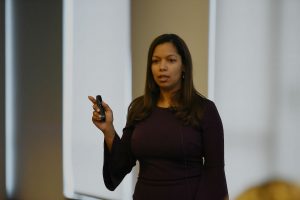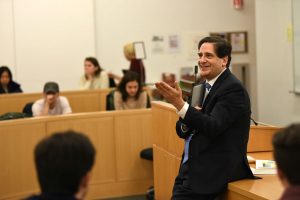Fordham Law alumna Adela Hurtado ’17 was one of 100 delegates selected from thousands of applicants to attend this year’s edition of the Yenching Global Symposium, which took place in Beijing, China, in late March. Delegates were awarded with an all-expense paid trip to Beijing to attend the event.
The Yenching Global Symposium is an interdisciplinary conference on China held annually at the Peking University of Beijing, the oldest university in the country. During the three-day event, delegates from all around the world attend lectures, panel discussions, workshops, and cultural excursions. This year, the theme of the symposium was “Women: Retelling the China Stories.”
“The Symposium brought scholars, business people and media personalities from around the world to discuss the theme,” said Hurtado. “We attended a variety of presentations and discussions covering women’s relationships with Confucianism, the status of women in the Chinese court system and politics, and women’s roles in Chinese cinema.”
Hurtado said she felt honored to be chosen as a delegate. Delegates are students and young professionals who pursue their passion for China in their work or research. “I was inspired by every delegate I met,” she added, “and the experience was unforgettable.”
The Fordham alumna has always been fascinated by China. She said her interest for the country dates back to when she was in 6th grade, when she read the Chinese classical novel Romance of the Three Kingdoms. She studied in China twice, first when she was an undergraduate student, and then when she was pursuing her law degree at Fordham. Her love for China motivated her decision to apply to take part in the symposium.
Born in Miami Beach to Peruvian parents, Hurtado pursued her bachelor’s degree in Political Science and East Asian Studies at New York University. After graduating from NYU, in 2014, she was admitted into Fordham Law. At Fordham, she studied public interest law, Chinese law, and business law. During her last semester, she was accepted into Professor Chi Adanna Mgbako’s International Human Rights Clinic, where she worked on a project in collaboration with Amnesty International.
“I’ve always wanted to learn about other cultures,” she said. “And I’ve always wanted to help people. The clinic was an invaluable experience of both.”
After graduating and passing the bar exam, Hurtado joined the International Service for Human Rights, a non-governmental organization based in Geneva and New York, where she is a Legal Fellow. “We advocate at the United Nations on behalf of human rights defenders from around the world and we help them bring their cases to the UN and international courts,” she explained.
Besides her work as a lawyer, Hurtado is also a talented photographer and animator, with projects focusing on China and Peru. She is also currently taking animation classes at the School of Visual Arts in New York.
“I hope that I can continue to help others while pursuing my career in law and the arts,” she said. “I am grateful for the experiences I’ve had so far, and I’m excited to see what’s next.”
The post Fordham Law Alumna Attends Yenching Global Symposium in China appeared first on Fordham Law.







